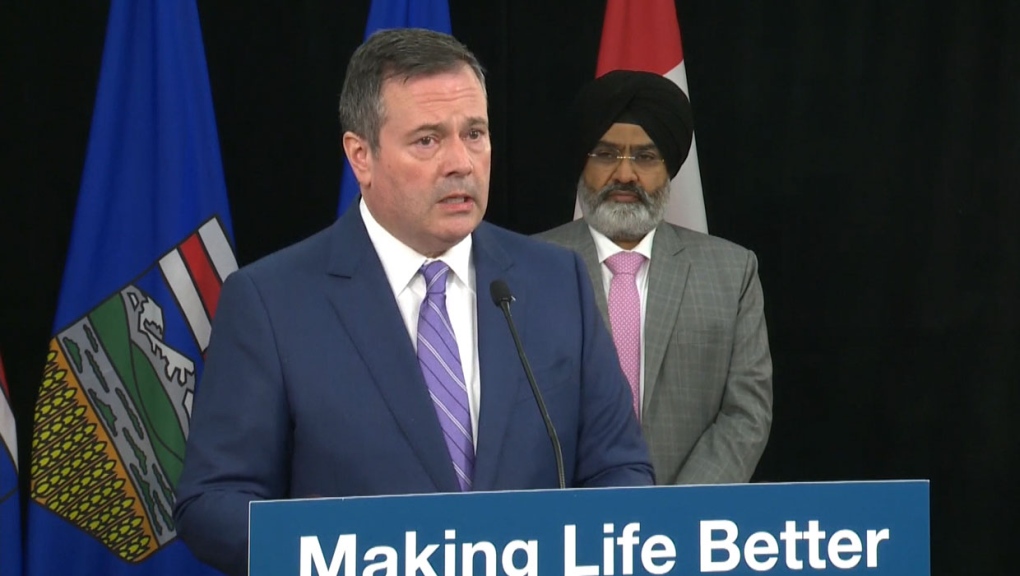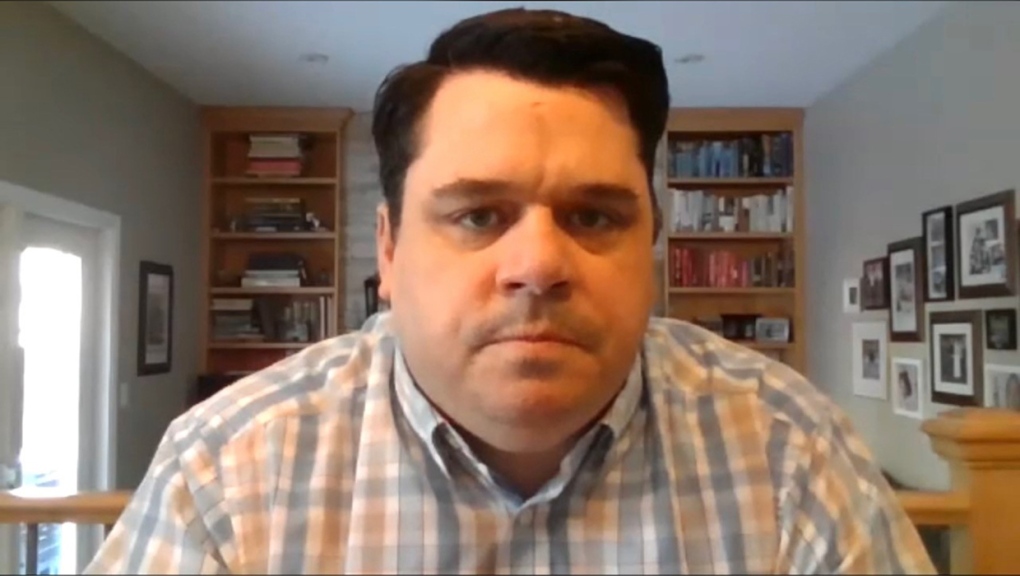Past the peak? Alberta experts cautiously optimistic as Omicron variant begins downward trend
Alberta’s health-care system remains under extensive strain with more people in hospital than at any previous time during the pandemic, but signs from wastewater analysts suggest the province is slowly beginning to surpass the peak of COVID-19 infections.
In Calgary, analysts tested wastewater through PCR signals and noticed in late December that the intensity of the virus spiked four to five times higher than the previous Delta variant.
Casey Hubert, research chair in geomicrobiology at the University of Calgary, said that since Jan. 11, those numbers have slowly trended downward.
“What we're looking for now is to see the PCR signal dropping over a successive number of days so if that trend continues, we will be able to predict even better if this virus is in fact slowing its spread,” Hubert said.
"We know with wastewater that we're catching everyone, and that's what's really valuable about it," Hubert added. "What we saw earlier in the pandemic is that wastewater testing correlated with clinical cases about one week in advance so what that means is that wastewater can provide an early warning signal about which way we're headed with COVID-19.”
Hubert noted that cases of COVID-19 are declining in 15 of 19 Alberta communities, including significant declines in the major hubs of Calgary and Edmonton.
ALBERTA NOT FOLLOWING ONTARIO REOPENING: KENNEY
On Thursday, Premier Jason Kenney announced Alberta will not follow suit with Ontario in reopening, noting that pressure on the health-care system is still expected to increase in the coming days.
However, he did say that Alberta could soon see a reprieve in case numbers.
“If the (Omicron) variant performs in Alberta like it has in jurisdictions all around the world, we can reasonably expect that we may now be beginning on the downslope of transmissions,” he said.
 With a UCP leadership review vote days away, a new poll shows Alberta Premier Jason Kenney stuck around 30 per cent
With a UCP leadership review vote days away, a new poll shows Alberta Premier Jason Kenney stuck around 30 per cent
“When do all these restrictions end? My answer is hopefully soon, but we have to get past Omicron. We’ve not yet reached the peak of hospitalizations; we have to support our health-care workers."
Kenney added that positivity rates are beginning to drop. On Thursday, the rate of positivity sat at 33 per cent, down from 41 per cent just one week prior.
Alberta also increased its hospital bed capacity, which included 18 additional beds set to open in the response unit in Edmonton and another 12 in Calgary’s South Health Campus starting Jan. 24.
The province reported 3,527 new infections and 264 more hospital admissions, raising the total number of patients receiving care to 1,131 — including 108 in intensive care. That marks the third-highest number of patients in hospital to date.
Eight more deaths were reported on Thursday, pushing the pandemic total to 3,421
HOSPITAL SYSTEM REMAINS A CHALLENGE
Infectious disease expert at the University of Calgary, Dr. Craig Jenne says the recent wastewater analysis is a positive data point in showing that the rapid expansion of the COVID-19 virus has stopped, but more encouraging data is still needed.
 University of Calgary's Craig Jenne infectious disease expert said the low vaccine rate among 20 to 29-year-olds could be a concern when school goes back to class in the fall
University of Calgary's Craig Jenne infectious disease expert said the low vaccine rate among 20 to 29-year-olds could be a concern when school goes back to class in the fall
He says Alberta can safely say it’s hit the peak only once the downward trend continues for several more days or a few more weeks.
“I think that that's one thing that we have seen throughout the pandemic is this time disconnect between the peak of new cases and peak of hospitalizations as hospitalizations always follow two to three weeks after the peak of infections,” Jenne said.
“So when we pass this peak and we start the downward side of new infections, unfortunately hospitalizations will continue to rise for a period of time.”
Jenne also noted that one of the only true ways to see a solid decline is to increase the number of Albertans receiving booster shots.
“People that are fully-vaccinated and boosted are at significantly lower risk when we compare them to age matched and health condition matched non-vaccinated patients requiring hospitalization or requiring ICU admission,” he said.
“Depending on the age group, sometimes this is approaching 20 times less at risk.”
Disease specialist with the University of Alberta, Dr. Lynora Saxinger agrees that hospitalizations will increase according to past trends, including a further burden on health-care workers.
 Dr. Lynora Saxinger
Dr. Lynora Saxinger
"And again, on the way down, there's just as many cases so we would be anticipating really significant challenges in the health-care system for the next several weeks and we're already I think, struggling and having to open new spaces and having difficulty with staffing,” she said.
“The staff are under a lot of stress already so I can't say that this is looking to be a great time and weeks ahead.”
To help ease staffing pressures, 610 nursing students will join Alberta Health Services to help provide pandemic care. The students will be supervised by trained nurses and receive educational credit.
LAW PROFESSOR: MESSAGING FROM PROVINCE WILL INFLUENCE HUMAN BEHAVIOUR
University of Calgary law professor Lorian Hardcastle notes that messaging from Premier Kenney and the province has been "watered down" and should stress the importance of taking a more proactive approach to slow spread of the virus.
“The government had time to do more to make schools safe in that week that the children were delayed and coming back and certainly there have been a lot of disputes around school ventilation,” Hardcastle said.
“I think as well, we had less supply of rapid tests, for example, to give children in schools than in other provinces, because we had used so many of our rapid tests in the private sector.”
Hardcastle noted that Kenney will need to be careful in what he says to the public so that others may not be encouraged to take less precautions that they otherwise might take.
For example, she noted that AHS workers were prepared to deal with the vaccine mandate and not to exempt worksites, but had received a directive from the Ministry of Health to exempt particular sites.
“So these measures were the AHS vaccine mandate hasn't been strictly enforced, have really been driven by the government rather than rather than AHS itself,” Hardcastle said.
“It’s not clear if those workers were truly needed back to keep the healthcare system going or whether there are political undercurrents around the premier and some of his caucus or constituents who are unvaccinated.”
CTVNews.ca Top Stories

Quebec nurse had to clean up after husband's death in Montreal hospital
On a night she should have been mourning, a nurse from Quebec's Laurentians region says she was forced to clean up her husband after he died at a hospital in Montreal.
'Anything to win': Trudeau says as Poilievre defends meeting protesters
Prime Minister Justin Trudeau is accusing Conservative Leader Pierre Poilievre of welcoming 'the support of conspiracy theorists and extremists,' after the Conservative leader was photographed meeting with protesters, which his office has defended.
'My stomach dropped': Winnipeg man speaks out after being criminally harassed following single online date
A Winnipeg man said a single date gone wrong led to years of criminal harassment, false arrests, stress and depression.
What is changing about Canada's capital gains tax and how does it impact me?
The federal government's proposed change to capital gains taxation is expected to increase taxes on investments and mainly affect wealthy Canadians and businesses. Here's what you need to know about the move.
Bank of Canada officials split on when to start cutting interest rates
Members of the Bank of Canada's governing council were split on how long the central bank should wait before it starts cutting interest rates when they met earlier this month.
Pilot reported fire onboard plane carrying fuel, attempted to return to Fairbanks just before crash
One of the two pilots aboard an airplane carrying fuel reported there was a fire on the airplane shortly before it crashed and burned outside Fairbanks, killing both people on board, a federal aviation official said Wednesday.
Police tangle with students in Texas and California as wave of campus protest against Gaza war grows
Police tangled with student demonstrators in Texas and California while new encampments sprouted Wednesday at Harvard and other colleges as school leaders sought ways to defuse a growing wave of pro-Palestinian protests.
'One of the single most terrifying things ever': Ontario couple among passengers on sinking tour boat in Dominican Republic
A Toronto couple are speaking out about their 'extremely dangerous' experience on board a sinking tour boat in the Dominican Republic last week.
7 surveillance videos linked to extortions of South Asian home builders in Edmonton released
The Edmonton Police Service has released a number of surveillance videos related to a series of extortion cases in the city now dubbed 'Project Gaslight.'































